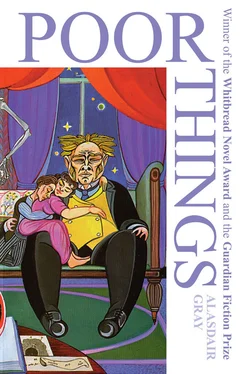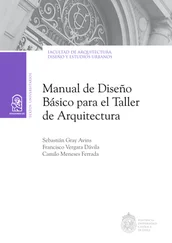I wanted to kiss that little stranger for the sense he talked and the good he wished to do. Instead I had to sigh and explain that alas my poor man would take no advice from me because he felt weak when he did, strong when he did not. I said, “But he might take advice from another man. Please tell him what you have told me. Here he comes.”
Wedder, suddenly seeing me talk to a stranger, broke out of the crowd and strode toward us his hair sticking out all ways like the bristles of an over-used scrubbing-brush. His face seemed more blue than white and his eyes were bloodshot. Beside him hurried a servant in the livery of the betting-shop, carrying the winnings in a bag.
“Duncan,” I said, “please listen to this gentleman. He has something important to tell you.”
Wedder folded his arms and stood very stiff, staring down at my new friend. The stranger had spoken only a few sentences when Wedderburn said sharply, “Why are you telling me this?”
“If I see two children who know nothing about express trains picnic on a railway line it is natural to tell them of the danger,” said the stranger, “but if you need a more personal reason, hear this. An English friend (Mr. Astley, of Lovel and Co., a famous London firm) once did me a favour I have never managed to repay. Since I owe the English something I wish to pay them back a little through you.”
“I am a Scot,” said Wedderburn, looking at me, and I saw something imploring in the look.
“That need not deter me,” said my new friend. “Mr Astley is a cousin of Lord Pibroch.”
“We must leave, Bell,” said Wedderburn tonelessly, and I realized he had folded his arms tight to stop himself trembling. Sleeplessness and excitement had so exhausted him that he could hardly hear or see a thing; all his strength and concentration were needed just to keep him standing and sounding sensible. Instead of giving him a row for his rudeness I slid my arm through his and he clutched it.
“My poor man needs rest now, but I shall remember what you told me. Thanks very much. Good night,” I said.
As we moved toward the door accompanied by the servant I saw Wedderburn was sleep-walking like I had done.
In the entrance hall I pinched him awake to learn the name of our hotel. When he got conscious he said he needed a lavatory first and tottered off to it with the servant carrying his winnings, for he would not let those out of his sight. A second later my new friend was beside me again, speaking so fast and quiet that I must tilt an ear toward him.
“Your husband looks too distraught to count his winnings tonight. Take and keep as much of the money as you can without him knowing. That will not be theft. If he gambles again it will be your only means of leaving this town with dignity.”
I nodded, shook his hands with both of mine and said I wished I could help him in some way. He blushed rosy-red, smiled, said, “Too late!” bowed and left.
Soon after Wedder came back looking neater. His face was still the same horrid colour but there was no sign of trembling and tiredness in him now. I knew he had taken one of the anti-lethargy pills and another wedding night was coming up. As he gripped my arm in a masterly way I thought, “How long can the poor soul keep going like this?”
At the door a very grand looking man said, “Gute Nacht, mein Herr! Your custom tomorrow we shall receive, I furiously hope?”
“Of course,” said Wedder with a grim smile, “if your gold-mine is not yet exhausted.”
“Not from me but from your fellow players you have won,” said the man amiably, so I knew he was the head shopkeeper.
Outside I found that the shop, our hotel, a bank and the railway station were all on the same square, so we had not far to go. On reaching our room Wedder seized the bag from the servant, slammed the door in his face without saying thanks or tipping, ran to our bed (a huge one with a canopy) and emptied the money onto it with a kind of tinkling crash, for some envelopes split open. He flung these envelopes to the floor and began ripping other envelopes and pouring out coins, mad keen to make one big puddle of his gold on the silk bedcover. I realized that, like little Robbie Murdoch with a mud puddle, he would then splash about in it before counting it. This might go on all night. I had to distract him somehow.
“At this point I will omit two pages,” said Baxter. “They cast strong light into that zone where anatomy and psychology are forms of each other, but your future wife will one day teach you such things in person, so why anticipate them here? In chaste and accurate language Bell tells how, for a few hours, she wooed Wedderburn away from his infantile obsession with gold and restored him to a deep and natural slumber on a bearskin hearth-rug. She tells how she removed and hid four hundred friedrichs d’or from the pile on the bed, and how he did not miss these when he awoke and counted the rest into neat heaps. I will continue from there.”
“Tonight this will be multiplied ten- or a hundredfold,” he said with a gloating smile. I told him he was a fool.
“Bella!” he cried, “all last night people begged me to stop playing before my luck ran out. I played to the very end and won because I was using REASON — not luck. You, at least, should have faith in me because in the eyes of God you are my lawful wedded wife!”
“God will let me leave you whenever I choose,” I said, “and I will never set foot in that betting-shop again. I bet you will lose everything if you go in again — everything.”
“What will you bet?” he asked, with an odd look. I smiled then, because I had a very bright idea. I said—“Give me five hundred of that money. If you come back richer I will return it and marry you. If you lose the rest we will need it to leave this place.”
He kissed me and wept, saying this was the happiest moment of his life, for now he knew he would have all he could ever want. I wept out of pity for him — what else could I do? Then he gave me the five hundred, we breakfasted and he left. I asked the hotel folk to serve lunch in my room, went back to it and slept.
How lovely, God, to waken all alone, and bath and dress alone, and eat alone. When we get married, Candle, we must spend some time apart to stop us going stale. In the afternoon I went walking round a park in the middle of the square, hoping to see my new friend, and so I did, in the distance. I waved my parasol. From opposite sides we approached an empty bench and sat on it. He asked delicately, “Did you?”
I smiled, nodded and said, “How is my man doing?”
“O, he began early and lost it all in an hour. He staggered us all by his extraordinary coolness. He has since been twice to the bank and four times to the telegraph office — so the rumour goes. Great Britain has the world’s largest and busiest money-market. We expect him to return and lose as much again, or more, in an hour or two.”
“Let us talk of happier things,” I said. “Do you know any?”
“Well,” he said with a rueful smile, “we could talk of the radiant future of the human race a century hence when science, trade and fraternal democracy will have abolished disease, war and poverty, and everyone will live in a hygienic apartment block with a free clinic in the basement run by a good German dentist. But I would feel lost in such a future. If God consulted my wishes (and maybe he did) he would make me a disgraced outchatel — an unemployed manservant — a lover of Russia who would rather chat to a brave Scotswoman in a German public park than fight for the renovation of his homeland. This may not be much but it satisfies me, and is better than being a bed bug. Though of course, bed bugs too must have their unique visions of the world.” 17
Читать дальше












